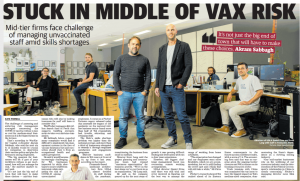
Over the last month or so I have been listening to and discussing what the hidden depth of high performance is and what part winning plays in that. A part of me rejects the desire to grade performance and yet another part recognizes the true value in measuring something to give it meaning. This is the ‘aha’ moment for me – that to feel I have performed well, to get that ‘winning well’ kind of feeling, I need to experience a light bulb moment of clarity about why or how I performed well.
It is a topic that intrigues me – I am curious, in a scientific kind of way, about what other elements and machanitions are there that move us into high performance and create that ‘winning’ feeling, especially in this ‘brave new world’ of post-pandemic business-life.
If performance is a measured thing to make it high or low, then it should be simply a matter of putting all the skills and competencies in the right place and letting them distill into high performance. However, we know it is not as simple as this.There is another side to the high performance coin that comes from the energy and commitment. So one side of high performance could be skills and competencies (tools of the trade) and the other side could be the energy and commitment (inner purpose) we are feeling. What I have noticed when working with teams and high performing indiviudals is that they balance these elements around their closely held values. I am still left wondering what else there is in the formula that turns a performance into a feeling of ‘winning well’.
When I reflect on this, what stands out to me is that it is our feelings that inspires us and our feelings that we use to measure how well we have performed. Whether it is a ‘ho-hum’ performance or quite fulfilling, our feelings are the guide! Hence, my curiosiness has lead me to conclude that as high performers we are searching for an immeasurable measure to confirm our high performance, to give us that ‘winning well’ feeling.
As a leadership coach, I have discovered that a feeling of ‘winning well’ is a very individual thing because the ‘well’ part of the phrase comes from the measure of the individual or the team I am working with. It’s not something that can be arbitrarily applied or externally measured to claim the ‘winning well’ title.
On a personal level, I need to experience an ‘aha moment’ to give me the ‘winnng well’ feeling. My ‘aha moment’ is when there is a sudden understanding of what is behind a knarly issue or the different perspective I can take to unlock the next steps for me or my client. So this is my measure of ‘winning well’. No matter what anyone else tells me or explains to me, unless I experience an ‘aha moment’ I feel like an underperformer.
In William B Irvine’s book Aha!: The Moments of Insight that Shape Our World, he explores the many varieties of ‘aha moments’ that have resulted in significant wins for humankind and the world we live in. The ‘aha moment’ could be a moral revelation or a scientific revelation or simply a small trigger that changes the way we approach something. They don’t all have to change the entire world, but they do have to result in new insight and will make an impact on us. Something we easily remember and recall over and over.
My insight or ‘aha moment’ when pondering on ‘winning well’ and high performance, is that a key element of the formula is to discover something and share it. It can be to reveal a truth that hasn’t seemed relevant, or it can be a new perspective on an old issue, or it can be an awareness of why everything worked well and knowing how we can repeat it.
So the fundamental nature of ‘winning well’ for me is in the sharing of the win to make high performance sustainable – it’s in my response to the experience. What is it for you? I would love to hear your thoughts.
~ Margaret Armitage















